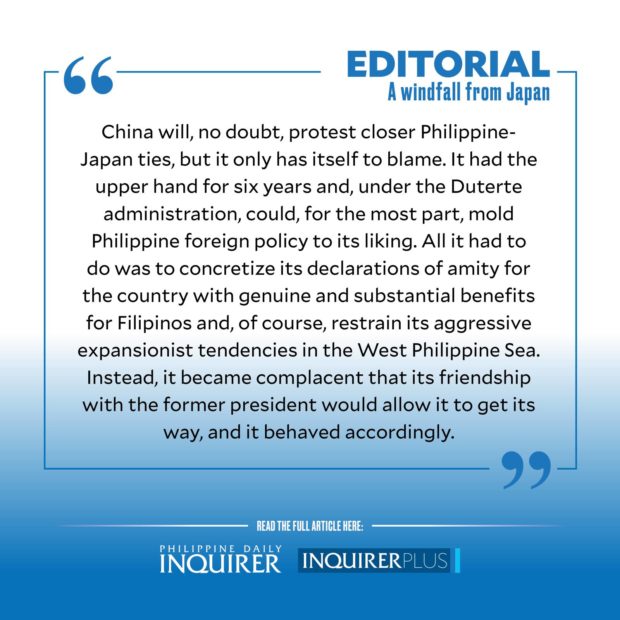A windfall from Japan
That the Philippines reaped a windfall of potential investments from Japan courtesy of President Marcos Jr.’s official visit to the Land of the Rising Sun was expected.
It is a welcome development, to be sure, and our government and the tycoons who contributed to the pile of new ventures and business expansions that will happen in the wake of the Chief Executive’s trip rightfully deserve credit for buttressing the uneven economic growth of the Philippines as it recovers from the ravages of the pandemic.
Article continues after this advertisementIndeed, the $13 billion in investment commitments made by Japanese industrialists is, by any measure, impressive. But it is, by no means, the biggest development to emerge from the President’s trip to Tokyo.
Japan is, after all, still the Philippines’ biggest provider of official development assistance loans, accounting for almost 80 percent of total cheap financing for our country in the latest tally. And it has been so for at least three presidential administrations now—almost two decades—and, almost certainly, long before that.
Through soft loans and aid that funded key pieces of the country’s infrastructure and major development projects, the world’s third-largest economy has been a steady and reliable partner in helping build the Philippines.
Article continues after this advertisementAlongside these important statistics is the fact that Japan’s private sector business community is collectively the biggest investor in the Philippine economy, with factories in various ecozones assembling vehicles for local use or electronics for export.
In other words, Japan is a country that puts its money where its mouth is. Its profession of friendship for the Philippines is backed up by concrete action and billions of dollars and trillions of yen in investments … unlike other countries who promised billions of dollars in investments but only realized two- to four-lane bridges spanning the narrow Pasig River, and, worse, used military-grade lasers that caused our Coast Guard personnel temporary blindness in waters internationally acknowledged to be within our exclusive economic zone.
So if the economic benefits from Japan is not the biggest news from the President’s Tokyo trip, what is?
We believe it is simply this: that the Philippines and Japan have committed to strengthen bilateral relationships in the aspect of geopolitics, with both nations aligning their interests toward preserving the balance of power—and of peace—in the Asia-Pacific region.
Specifically, talk of closer military ties between the Philippines and Japan to deter China’s aggressive actions in disputed waters is a positive development. Japan has a strong naval tradition and can help the Philippine Navy and Coast Guard better guard the country’s territorial waters, protect the interests of Filipino fishermen whose livelihoods are being destroyed by China’s continuing blockade of rich fishing grounds, and safeguard open sea lanes that are crucial for international trade.
This comes at an opportune time for us as Japan is emerging from decades of postwar isolationism and begins to contemplate the need to adopt a regional military stance that is more commensurate to the economic power it wields.
China will, no doubt, protest closer Philippine-Japan ties, but it only has itself to blame.
It had the upper hand for six years and, under the Duterte administration, could, for the most part, mold Philippine foreign policy to its liking. All it had to do was to concretize its declarations of amity for the country with genuine and substantial benefits for Filipinos and, of course, restrain its aggressive expansionist tendencies in the West Philippine Sea.
Instead, it became complacent that its friendship with the former president would allow it to get its way, and it behaved accordingly. Now China is paying for its bullying behavior with the most forceful pushback from the Philippines, supported by the United States for obvious reasons, and now in consonance with Japan, thanks to Mr. Marcos’ efforts.
Yes, we hear the protestations of pro-China parties who point out that the Philippines was once a victim to the expansionist ambitions of both the US and Japan. But that was several lifetimes ago, and both countries now share common values with us, especially in terms of promoting democratic ideals and free-market economics. China, on the other hand, has seized territory and corresponding resources that should be ours even as we speak.
The choice for Filipinos is a no-brainer: The Philippines’ interests come first. And right now, Japan, the US, and just about everyone else in the region are aligned with our interests as a nation. Except China, and that is because of its own actions.
















